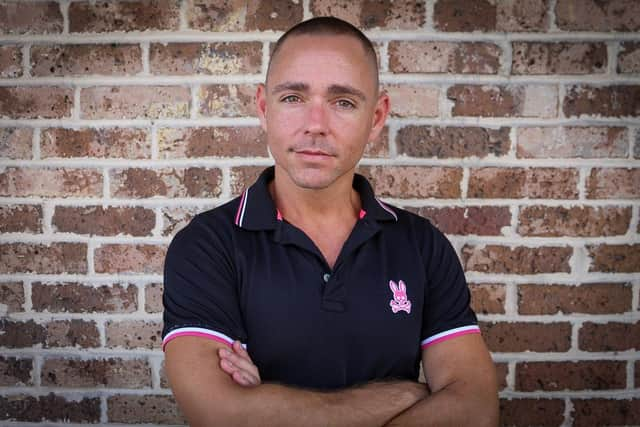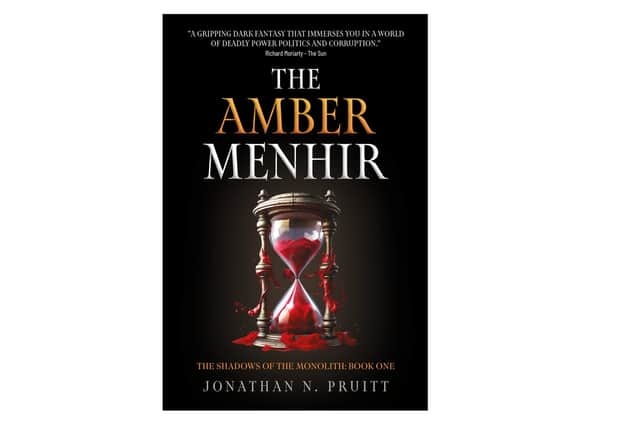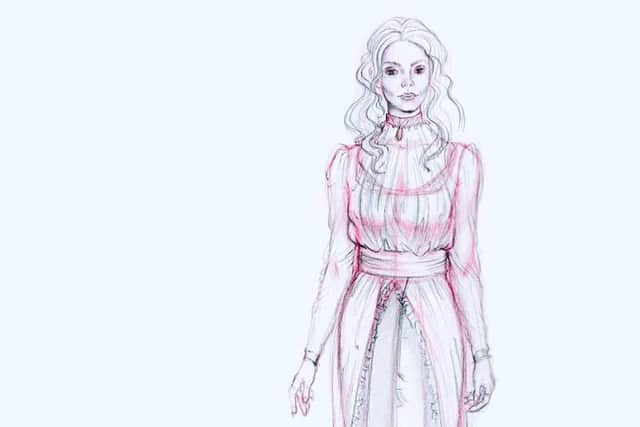Magic and murder: Meet the man behind this latest fantasy fiction novel – your next good read


Q. The fantasy world you have created is threatened by an ominous entity known as ‘Calamity’. What can you tell us about the nature of Calamity, and why it is so dangerous?
A. Calamity is a slow-moving nebula destined to intercept the path of this world in tens of thousands of years. Menhir scholars convey that every planet that has neared Calamity has broken apart. It is therefore vital that humanity leverages its collective energy and wisdom to discover a means of circumventing Calamity’s effects. Each of the six factions within the menhirs adopts a different set of goals and philosophies they argue will defeat Calamity. This is why the menhirs rose. This is the figurative dragon that society, and the menhirs, in particular, must slay.
Q. The Amber Menhir features three students, known as ‘ascendants’, entering an institution of learning and research by the same name. Can you tell us more about what the menhirs are.


A. According to the Menhir Conclave Charter, the five menhirs rose in response to Calamity’s threat and have since trained each generation of magical scholars in the skills necessary to save the world. The menhirs also store the discoveries of generations gone by, so that each and every ascendant connects to a well of ideas and imagination that dates back as far as the menhirs themselves. It is without hyperbole when the menhirs say that they are the world’s only hope of survival and prosperity, though the path forward will not be easy or cheap.
Q. Can you tell us more about the six noble magical factions which populate the menhir?
A. At the origin of the menhirs, a census was taken of the incipient magical aptitudes known to manifest within a small subset of the continent’s families. A group of intellectuals that would eventually give rise to the first menhir scholars identified six hereditary nuclei of magic. Members of these factions could witness the energies of each other and learn how to execute one another’s feats. These nuclei became the six Noble Factions, which have existed in total perfection and unmolested for millennia. And the menhirs are happy to convey the idea that this will always be.
Q. There is a degree of scathing satire and political commentary in your dealings with the menhirs, which are riddled with bitter and deadly rivalries. Why did you feel it important to include this?


A. You show me an organisation where resources and opportunities for advancement are limited, and I’ll show you a den of intrigue and infighting. To describe anything different in literature would be, I think, unrealistic, and worse, naïve. If there’s no infighting, then there’s been a genocide, and even that buys you only a little time.
Q. There is a subplot about ‘anomalies’ — unfortunate individuals whose magical powers deviate from the norm and who end up as laboratory guinea pigs. Where did this idea come from?
A. Every breed of discovery needs subjects and replication to ensure the reliability of a conclusion. For some of the menhirs’ noble factions, that includes anomalies. Anomalies are those dangerous few who display magical aptitudes outside of the safe harbours of the noble bloodlines. The menhirs work hard, however, to ensure that their anomalies are ethically treated before being sacrificed. The same is true of our world, believe me.
Q. Out of all the novel’s characters, which do you empathise with the most, and why?


A. I try not to bond too closely with any character. I think a moat of distance is healthy. At the risk of appearing self-deprecating, it’s always the flaws of a character that endears them to me.
Each of the major characters in The Amber Menhir is a bit broken. I think it’s that vulnerability that lets me feel for them. Like real people who masquerade as impervious, unflawed characters lose my interest. They feel dishonest to me. So, I ensure each of my characters possesses a considerable flaw that a reader might see in themselves, or a loved one, or a rival, or someone in their past.
Q. Which fantasy writers or titles would you compare your new novel to the most, and in what respects?
A. I hesitate to compare my writing to anyone’s. But I think it might be safe to say that the first book mixes the magic mischief of Hogwarts (Harry Potter) with the cynical intrigues of The Red Keep (Games of Thrones and sequels). Still, I run a leaner ship than most epic fantasies and try to keep the story’s advancement tidy. You won’t be reading about how much butter dripped from the capon, nor do I feel particularly compelled to tell you that the deceased chicken was a castrated male.
Q. Without spoiling anything, which one scene in the novel delights you the most?
A. The plot-bus runs over the main characters midway through the first book and the stakes reach a fever pitch at a meeting near the end. The five main characters must cooperate to defend themselves and their allies. Writing and editing this scene was nightmare made flesh, but I’m pleased by the final product. I still can’t help but sneak in a witty line or two to pepper the action in the chapter, but I hope that the final product will thrill the reader. I think the moment is worth the time and ticket to entry.
Q. What do you hope readers will take away after reading the novel?
A. First and foremost, I hope they take away sense of enjoyment, mystery, and the sinister brought to literary life. I hope they’ll enjoy some pearls of wisdom too, but I’m okay with readers leaving those at the door. When writing the books, I wanted to create a world teeming with tensions and evils brought about by sound rationales. The menhirs impose much hurt upon the people they train and serve, but they do so using sound logic. Most any philosophy left unchecked will take you to dangerous places. This fictious world is just one case study.
Q. The Amber Menhir is the first in a series of five interconnected novels. Again, without giving away any spoilers, what can readers expect from the next instalment?
A. Well, Book 2 draws us out from the Amber Menhir and into the broader sociopolitical jockeying between the five menhirs. Our heroes must tread carefully out there, however, because the menhirs care little about those they crush amid their bladed dance. We meet ambassadors, of a kind, from each menhir and learn the guiding philosophies and idiosyncrasies that have allowed each institution to survive their game. The readers will see deeper into the world’s past and obtain hints of the world’s intended future. Book 3 and onward see the development of a possible remedy.
Q. Your novel has been compared to the writing of philosophical American literary giant Ayn Rand. Is that a fair comparison?
A. I’m flattered by the comparison but I daren’t speak to its fairness. Not for me to say. Whether or not you enjoy Rand’s philosophical prescriptions for societal advancement, she certainly succeeded in crafting tales that served as effective vessels for her warnings. One might argue that was their only purpose. I enjoyed her works in my school years. She remains one of the most heavily referred-to novelists in the intellectual circles that I’ve been lucky enough to enjoy. Though, those references aren’t always kind. I do try and be a touch more pluralistic in my satire, but only just. In the end, we offer different utopias and prescribe contrasting medicines, but there are resemblances.
Q. Your novel subverts a lot of the normal tropes associated with the fantasy genre. Can you give an example, and explain why moving away from those tropes has been important to you?
A. I think subverting tropes is inevitable as new writers descend upon a genre. Some of that subversion is intentional, to differentiate one’s writing from prior tales or to convey a new message or an old one in new dressings. I think subverting tropes also happens by default when new minds that developed at different moments bring contrasting experiences, biases, and insights to their stories. An example in this series is the ‘chosen one’ trope. In my world, the role of prophesies is far more sinister and intentional than most readers might expect. I hesitate to convey too much, but let’s just say the chosen one in my world isn’t born rich, doesn’t always succeed, and doesn’t grow up to become a magical cop. He, she, or they mightn’t be lucky enough to grow for very long at all … poor dears.
Q. How long did the novel take you to write, and what has been the biggest writing lesson you have learned along the way?
A. That depends as to when you deem a novel ‘written’. It took five months to complete a first draft. That draft was nearly 200,000 words and little of that original phrasing lingers in the current version. It took years and years to edit it to point where I deemed it ready to debut. The second book was drafted in four months. The third required a similar amount of time. I write about 1,500 words a day, every day, with no breaks while drafting. Then it takes another several months (two to three) for each major edit thereafter. As to the biggest lesson learned … poor and polished writing are almost twins. It’s just a little blemish here, a sightly freckle there, that distinguishes them. And my first drafts are always terrible. I hope that folks will like what made it through the gauntlet.
Q. What keeps you motivated to write?
A. It’s a dangerous kind of psychology that keeps me going forward. I need to feel like I’m creating something to feel justified as a person. When things are going well and I’m humming along with my writing, I’m exuberant. I see nothing but possibilities on the horizon. But that sort of euphoria has an opposing force. When I’m snarled in plot knots, when my lofty hopes are cut low, then I fall into a hole. A deep one. It takes a force of will to ponder and brainstorm my way out of it. Avoiding that hole keeps me going.
Q. The Amber Menhir would work perfectly as a film series. Who would you cast in the central roles, and why?
A. Oh, this is my favourite question yet! First, bear in mind that I can scarcely sit down long enough to watch anything. One of my exes describe me as having “metastatic wiggles”. I think Anna Taylor-Joy with her enormous eyes, delicate lips, and apple cheekbones would make a superb Tara Langcraw — she’s played icy, emotionally constipated, and aloof well before, too. For Ms. Ash, I think Helena Bonham Carter would be wonderful. She’s got that sardonic British gristle to her voice, and her depiction of Princess Margaret showed how delicate and beautiful her range can be in a seasoned character. Peony is a challenge, but Halle Bailey really impressed me in her role in the recent Disney flick. I was poised to dislike the whole affair, but Bailey brought her character, that inedible brightness, to life, despite the weight of so much expectation on her. That’s what Peony will take. Chesa, well, I think Gong Li is a good fit. Someone who can slide an insidious smile into her voice while she tortures, and is herself inwardly tortured. That’s Chesa. Li’s a stunning actress. Roland’s hard. He’s not especially handsome. He’s built like a farmer, fleshy but muscled, practical and no nonsense. Like a young John Goodman. I hope that actor’s out there and fingers crossed there’s a series in the eventual cards!
The Amber Menhir (Book One of The Shadows of the Monolith) by Jonathan N. Pruitt is out now on Amazon in paperback, hardcover, and eBook formats, published through Spinner Loom Press and priced £15.34, £28.58, and £9.99 respectively. For more information, visit TheShadowsoftheMonolith.com or follow the author on Instagram.